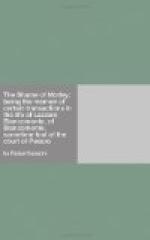I had been no better than those hinds of hers had I remained unmoved. I have said that I hated the very name of Sforza; but what had this tender child to do with my wrongs that she should be brought within the compass of that hatred? I had inferred that her pursuers were of the House of Borgia, and in a flash it came to me that were I so inclined I might prove, by virtue of the ring I carried, the one man in Italy to serve her in this extremity. And to be of service to her, her winsome beauty had already inflamed me. For there was I know not what about this child that seemed to take me in its toils, and so wrought upon me that there and then I would have risked my life in her good service. Oh, you may laugh who read. Indeed, deep down in my heart I laughed myself, I think, at the heroics to which I was yielding—I, the Fool, most base of lacqueys—over a damsel of the noble House of Santafior. It was shame of my motley, maybe, that caused me to draw my cloak more tightly about me as I urged forward my horse, until I had come into their midst.
“Lady,” said I bluntly and without preamble, “can I assist you? I have inferred your case from what I have overheard.”
All eyes were on me, gaping with surprise—hers no less than her grooms’.
“What can you do alone, sir?” she asked, her gentle glance upraised to mine.
“If, as I gather, your pursuers are servants of the House of Borgia, I may do something.”
“They are,” she answered, without hesitation, some eagerness, even, investing her tones.
It may seem an odd thing that this lady should so readily have taken a stranger into her confidence. Yet reflect upon the parlous condition in which she found herself. Deserted by her dispirited grooms, her enemies hot upon her heels, she was in no case to trifle with assistance, or to despise an offer of services, however frail it might seem. With both hands she clutched at the slender hope I brought her in the hour of her despair.
“Sir,” she cried, “if indeed it lies in your power to help me, you could not find it in your heart to be sparing of that power did you but know the details of my sorry circumstance.”
“That power, Madonna, it may be that I have,” said I, and at those words of mine her servants seemed to honour me with a greater interest. They leaned forward on their horses and eyed me with eyes grown of a sudden hopeful. “And,” I continued, “if you will have utter faith in me, I see a way to render doubly certain your escape.”
She looked up into my face, and what she saw there may have reassured her that I promised no more than I could accomplish. For the rest she had to choose between trusting me and suffering capture.
“Sir,” said she, “I do not know you, nor why you should interest yourself in the concerns of a desolated woman. But, Heaven knows, I am in no case to stand pondering the aid you offer, nor, indeed, do I doubt the good faith that moves you. Let me hear, sir, how you would propose to serve me.”




